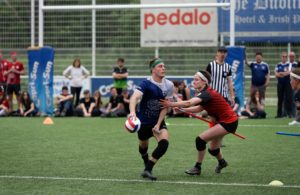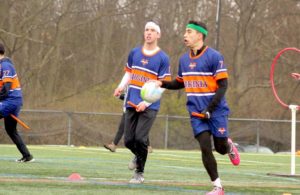- Rule, Britannia, no more?
- Unpopular Opinions: US Quadball Cup 2023
- Proven Contenders: University of Virginia
- Proven Contenders: Rutgers University
- Proven Contenders: University of Michigan
- Proven Contenders: Creighton University
- Different Perspectives: A Look Inside USA Ultimate
- Antwerp QC, Much of Belgian Core, Leaves Competitive Quidditch
Pick a Side: The Northeast

Credit: Jessica Jiamin Lang
With a new season upon us, the staff of The Eighth Man got together and identified key storylines in each region. Staffers then were assigned a side in favor or against each statement. This is the first installment in our Pick a Side series. It focuses on the oldest region, the Northeast.
The State of New York Will Take the Regional Title
Against: Ethan Sturm – Managerial Editor
Harry Greenhouse. Max Havlin. Jayke Archibald. Those names sound familiar? They should. They are all Quidditch Club Boston members that played for Team USA, which is two more Team USA players than any New York team can offer up. Add in Lulu Xu—who arguably should have been on Team USA—and you have the strongest starting lineup not just in the Northeast, but the entire country.
So what if they don’t have any depth? How many competitive games of quidditch do you actually think they’re going to have to play to get to the Northeast Regional Championship final? So what if they don’t intend to practice? How much rust do you think they are really going to acquire in six weeks while still attending Massachusetts Quidditch Conference meets and the Oktoberfest Invitational?
The fact of the matter is that this core group is well-versed in the dominant strategy controlling quidditch right now. Which means even if a team is significantly better and deeper than them, they won’t be able to get out of snitch range if Boston doesn’t want them to. And from there, it’s Havlin defending Greenhouse in the seeker game. That’s failed the Boston core exactly twice in the past 16 months: once, when Havlin and Greenhouse could both barely stand and, once, when the opposing seeker was Margo Aleman. There’s absolutely no reason to believe that either of those things will happen at the regional championship.
Rochester United may seem like the favorites on paper, losing by only 10 points to Boston at US Quidditch Cup 9 and retaining their entire team. But Rochester has never actually won anything, with star Shane Hurlbert accomplishing the impressive regionals, nationals and World Cup second place trifecta in the last calendar year. They even had Boston at its weakest in April—30 minutes past a grudge match with Lone Star Quidditch Club—and still couldn’t get it done.
RPI doesn’t have the seeker to spring the upset against Boston. The Warriors don’t have the beater to get it done. And who is to say the bracket won’t break in a friendly way and provide them with an easy, restful path to the final anyway?
The Northeast Regional Championship title has never once left the city of Boston. It has been won—in every iteration—dating all the way back to 2011, by Beantown’s best. The gap has closed, but we aren’t quite there yet. Get ready to put another notch in Titletown’s belt.
For: Kyle Jeon – Northeast Correspondent
For a region that gave birth to a sport known for diversity, the Northeast is severely lacking when it comes to which area of the region reigns supreme.
Since the inception of the Northeast Regional Championship, a team based in Boston has taken the crown every single time. With the reigning national champion hailing from the city of Boston, along with top-tier programs like Tufts University and Boston University, Boston still hosts some of the best teams in the region that will attend the regional championship in late October, and some might be inclined to think that this trend will continue. I, however, do not.
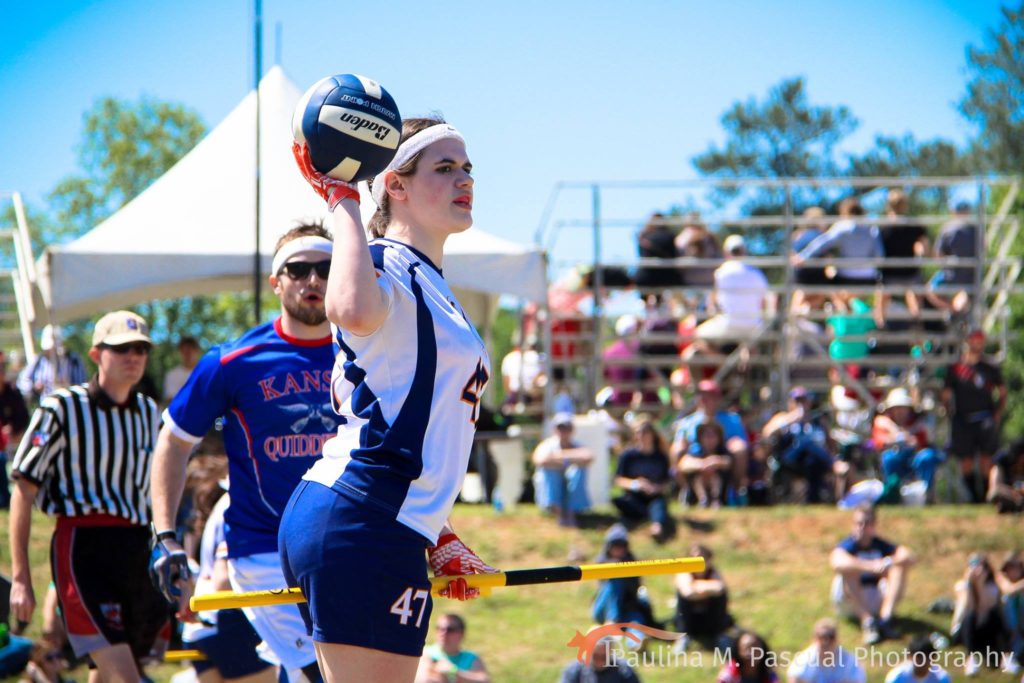
Credit: Paulina M. Pascual
Unfortunately for the city of Boston, the long run of championship dominance will come to a close, and a new regional champion will be crowned from the state of New York. Though New York hosts some well-regarded teams, three separate themselves above the pack: Rochester United, RPI and The Warriors. There is no doubt in my mind that one of these teams will take home the gold at the close of the Northeast regional this year.
RPI returns with a core group of players—most notably Teddy Costa and Mario Nasta. Their value to RPI is almost as similar as their last names. Costa is an irreplaceable point defender and driver for the RPI offense that often has to rely on his athleticism to score points on broken half-court sets, while Nasta was undoubtedly the MVP of the final of the 2016 MLQ Championship. He has firmly cemented himself as part of the elite tier of beaters who change the game whenever they step on the pitch. With these two leading the way—plus an experienced and talented supporting roster around them—there is no reason why they shouldn’t be able to keep any team in range and pull out a win.
The Warriors had a great showing at US Quidditch Cup 9, making a repeat appearance in the Sweet 16, and knocking out Great Lakes Regional Champion Univeristy of Michigan to do so. They have a group of veterans that have been playing this game about as long as anyone, and seem to have had a great recruiting class this fall—something that rarely occurs for a community team. If they can add just a few pieces around the core that has been on the cusp of greatness for so long, a regional championship is not a stretch.
Though the above teams are contenders, Rochester United should be considered in a tier of their own. Not only is Rochester the heavy favorite to win the Northeast Regional Championship, the squad is also one of two teams that every analyst is picking to make the final of US Quidditch Cup 10. It truly is a tale of two cities for the two national finalists, as their Boston counterpart has lost many valuable pieces from their championship run—and possibly the motivation to put in the effort they did last year. Rochester United has to be even more motivated, especially after getting a glimpse at the top only to be taken away by a single point during overtime in the finals. In my opinion, no team will be more motivated to prove themselves this year than Rochester United, and taking home the regional trophy will be the first step in their pursuit of the top that they came so very close to.
The Best Teams From the Northeast Will Not Be at Nationals
Against: Jayke Archibald – Northeast Correspondent
This is wholly untrue for a three main reasons.
First, the Northeast is projected for a larger number of bids this season than last, especially with four automatic bids coming in from the region’s performance at US Quidditch Cup 9. Thus, it should be slightly easier to qualify this year on numbers alone, meaning that teams not yet playing up to their highest potential should, in theory, still have a higher probability of securing a spot.
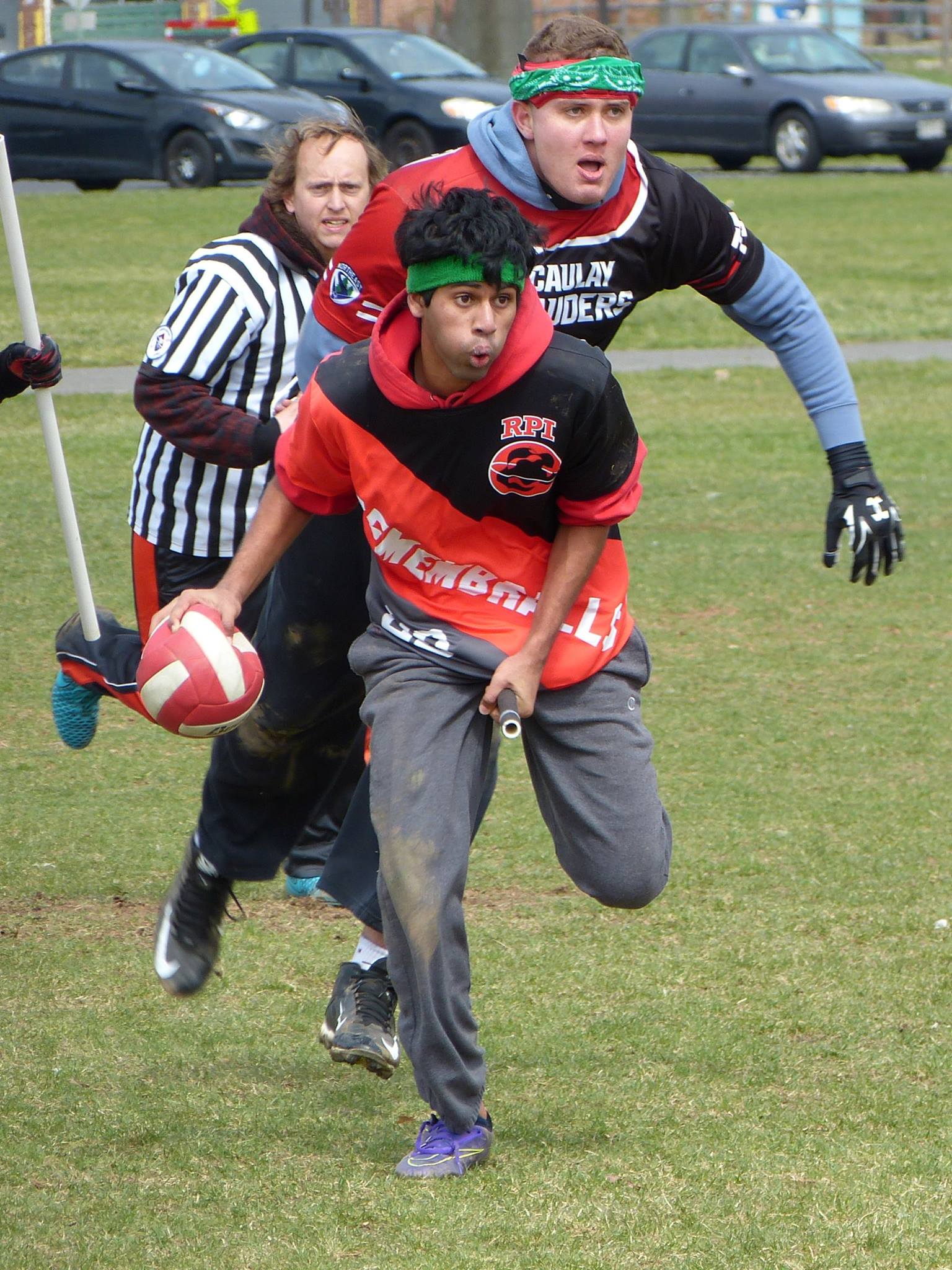
Credit: Charley Nasta
Second, there is a clear hierarchy in the region, broken down into groups of four: the major community teams (Rochester United, Quidditch Club Boston, BosNYan BearSharks and The Warriors), the top college programs (Boston University, RPI, Tufts University and New York University) and the bid challengers (Syracuse University, RIT, University of Rochester and Emerson College). It is widely accepted that the early date for the regional championship will not affect community teams, as they can start practicing earlier and on average have far fewer rookies. I would also argue it should not impact the top college teams, as they are the ones already returning a solid core of players, reducing the need for new recruits to be polished players come October. All four of the top college teams had multiple key players on MLQ teams this summer; they will be ready to go early in the season and in no danger of not qualifying. This leaves the last set of four, which are already so close in talent that I don’t see any of them having a significant advantage or disadvantage from the scheduling. Each is returning some players and will inevitably need to recruit, as well. Yet the most important thing is that none of them stand out already, and any edge one has over the other at this point has to be considered marginal at best.
Lastly, despite the early date for the regional championship, there is still a heavy schedule in the Northeast beforehand. Between the Snowbelt Conference, an expanded Massachusetts Quidditch Conference, the Southern New England Quidditch Conference and the Big Apple Quidditch Conference, almost all teams challenging for a US Quidditch Cup 10 spot are in a conference with multiple games scheduled. Game experience is the number one most important factor in helping get new recruits up to speed, and the potential of two lost weekends of practice will more than be made up for by conference games as they are currently schedule.
For: Tyler Walker – Managerial Editor
Think back to your earliest quidditch experience. It may be cringeworthy to think about the first time you tried to tackle, run with a broom or even played in your first match against another team. Even if you came from a sports background, quidditch is unlike any other sport. With so many pieces that move both together and separate from one another, it takes time to get players acclimated to the sport. More so than any other region, the Northeast college teams do not have that time. That lack of time will mean the region will not be represented by the best it could offer.
Only six weeks separate the start of most colleges in the Northeast from the regional championship deciding who will represent the region more than five months later. The teams who qualify will not necessarily be the best but rather the teams most prepared for the start of the season. For college programs, that means the teams who had the least-significant losses at the end of last year.
The early regional championship means all the community teams filled with experienced players will qualify. To be fair they deserve it, they are the most talented teams in the region. But BosNYan and Boston would be much more likely to see an upset if college programs had five months to prepare like the college teams in regions with spring championships. BosNYan is a fun team and does not have to take the regional championship seriously to still trounce colleges full of freshmen lucky to have a handful of official games. Boston is made up of some of the best players in the sport, but if colleges cannot trust their new recruits, they will not be able to test the depth of last year’s national champion. With MLQ, new players will be competing in a region heavily populated with players who have not taken time off in two years. For colleges, that means their top players will be in form, but for community teams, it means their entire team will be.
A bigger underlying issue is the stunt of growth for low-tier teams in the region. For all but about five colleges, their season will be done by Halloween. Meanwhile, teams in the West will compete until there is only two months left in the season. Without a competitive goal to work toward, the most athletic of players will fall off and find other ventures to pursue in college. Thus, keeping the top programs at the top because their players have something to work for the whole season, not because they are the best teams.
Community Teams Will Take Over at the Regional Championship
Against: Ricky Nelson – Mid-Atlantic Correspondent
Most quanalysts (deal with it) would have guessed the Northeast had potential to have the strongest lineup of community teams in the country and—as is often the case with people of our ilk—they are wrong. There are four major community teams in the region to consider and—far from dominating—they will struggle against younger college teams at the regional championship.
The teams attending the Northeast Regional Championship face several problems. The first is apathy. Reigning champions Quidditch Club Boston managed to grant many of their players a longtime dream—a dream that apparently did not include defending the aforementioned title. Almost the entire team defected or retired leaving a small cadre of Team USA players, much like the 300 skilled Spartans, but vastly outnumbered. Boston will likely be competitive against inexperienced teams, but now it is below what it was two years ago when it had a poor showing throughout the year despite hype.
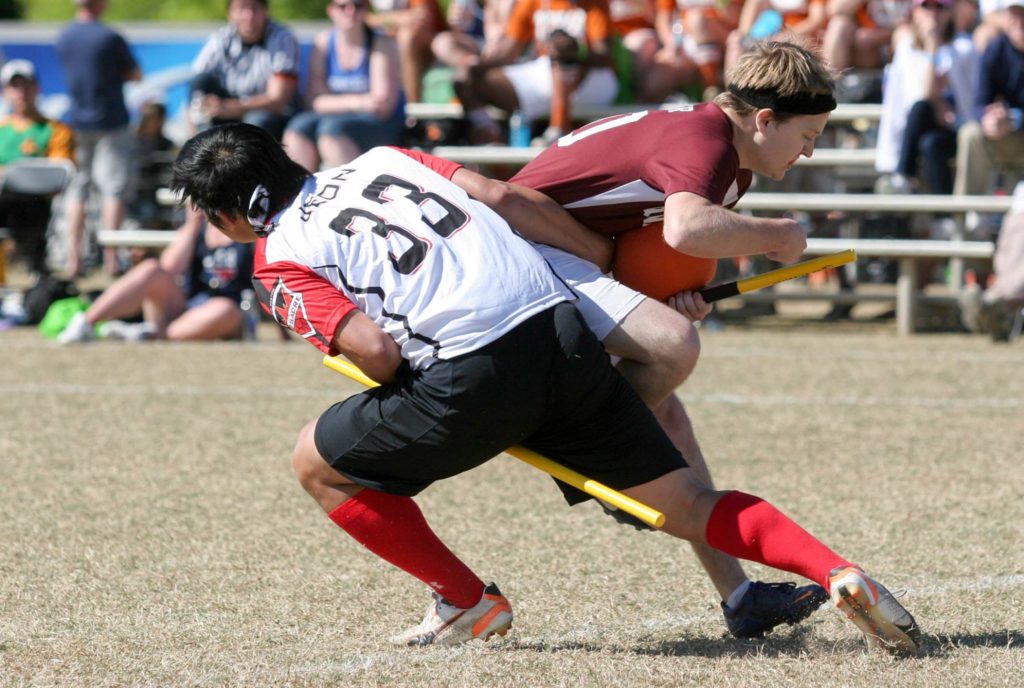
Credit: Matt Dwyer
A chunk of the defectors from Boston, including beater Kyle Jeon, headed to the BosNYan BearSharks, a team founded on the idea that Boston took the game too seriously. An idea that is patently false as Boston’s proved itself to be just what is necessary to win. The BearSharks are operating with the tried and failed satellite team model demonstrated by both the Jetpack Ninja Dinosaurs from Space (space… space… space…) and the NYDC Capitalists—with most of the players admittedly not caring about winning.
The third team is Sweet 16 finisher The Warriors. The Warriors has had its own roster depletion at beater, seeker and chaser that will hurt their chances of a repeat performance, with the new New York team promising fun and The Warriors in no position to offer championship wins, recruiting is going to be harder than ever to fill the vacancies from last year. Roster depletion aside, serious changes to management—or at least motivation—are necessary for a team that could not get enough players to practice for a scrimmage. That attitude is not enough to allow a team to do great, and results for the past few years support that position.
Rochester United, the national runner-up, is the only team that hurts my argument against community teams. The thing hurting Rochester United is aging a year. The squad still possesses the primary weapons that took them to overtime in the US Quidditch Cup 9 final last season and will utilize all of them to replace Boston as the dominant force in the region. Odds are they win the regional championship, but they won’t be playing another community team in the final.
For: Devin Sandon – Northeast Correspondent
Looking ahead to the new USQ season, one thing seems abundantly clear. The Northeast Regional Championship will be dominated by community teams. Coming out of US Quidditch Cup 9, the top four teams in the Northeast in terms of tournament finish were, Boston (champion), Rochester United (runner-up), The Warriors (Sweet 16) and RPI (Sweet 16). Now, several short months later, we are entering the new USQ season after a summer season that saw the cores of Boston, Rochester, The Warriors and the BosNYan BearSharks playing together—and at a high level. A decent number of college players also played MLQ, but they were not at the core of their respective teams; they were slotted in to fit the needs of the community team cores, in the community teams’ styles. While it’s certainly valuable experience, it doesn’t build synergy and consistency to nearly the same degree as the advantage gained by the community team.
Also, before even going any further, we have to acknowledge that college teams will have a roughly eight-week span to recruit and develop new players who have never seen the sport, prior to fighting for their program’s competitive existence. Sure, community teams might have to develop a new player or two, but it’s not a problem of nearly the same magnitude.
At the end of the last USQ season, the community teams were firmly in control of the Northeast. Given the challenges facing college teams at the beginning of a new season, anything less than utter domination by the community teams will be a surprise.

